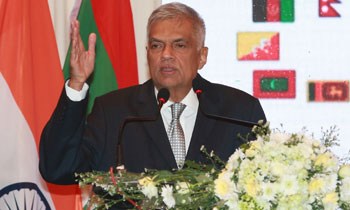Reply To:
Name - Reply Comment
 The Prime Minister said today that there should be maximum devolution and all religions to enjoy their equal rights, while Buddhism is treated and given the first and foremost place.
The Prime Minister said today that there should be maximum devolution and all religions to enjoy their equal rights, while Buddhism is treated and given the first and foremost place.
Delivering the keynote address at the opening ceremony of the Association of SAARC Speakers and Parliamentarians today at the Colombo Hilton, Prime Minister Ranil Wickremesinghe said there is a consensus among all political parties represented in Parliament, participating in the Constitution making process, that this country can’t be divided and should be one, which gives the meaning in Sinhalese as 'ekiya' or oneness.
Mr. Wickremesinghe emphasised that the Constitutional Assembly must decide on how a second chamber should be and how we move towards a system of proportional representation and how the constituencies on the lines of the New Zealand system.
The President Maithripala Sirisena declared open the 8th Conference of the Association of SAARC Speakers and Parliamentarians yesterday at the Colombo Hilton.
Speakers, Deputy Speakers and Parliamentarians from Sri Lanka, India, Pakistan, Bangladesh, Bhutan, Maldives, Nepal and Afghanistan are taking part in the three day confab.
Speaking further, Mr. Wickremesinghe said, we hold the 8th SAARC Speakers and the Parliamentarians’ Conference in the background of the 70th anniversary of Sri Lanka's parliamentary democracy as an independent country. We mark this year firstly to celebrate this occasion and secondly to commence the drafting of a New Constitution.
At the last presidential election, President Maithripala Sirisena as the common candidate pledged a New Constitution which would strengthen democracy, bring national unity by addressing the issues which were at the heart of the question of ethnic conflict.
“I thought I would explain to you the measures we have taken so far under the present Sri Lanka Constitution by enacting a New Constitution which lies with Parliament and the people at a Referendum. The task we had was how to get all the parties together. Not only the 2/3rd majority, we also had formed the national government and there were diverse views. There were those who came with us as an alliance to back the presidential candidate and then for the parliamentary election and those who came from other parties who had different positions. How do we try to ensure a consensus? The traditional way of constitution drafting has been for Parliament to appoint a Select Committee.
“The Select Committee gives the report - there’s a majority report and a minority report. But we felt that it was not appropriate for Sri Lanka to find a division and you find different reports coming as an official position of parties as official reports. So we have used another mechanism. A modified version of Constituent Assembly.
“The Constituent assembly will enable us to consult the whole country before we reach an agreement. If we cannot reach an agreement then we would have to report so to Parliament. So rather than have a Select Committee, which was just called for evidence and have the divisions of Parliament, we thought, let this Constituent Assembly give a free flow, let the people express their views and then within their Constituent Assembly see how we can narrow and reach a consensus", Mr. Wickremesinghe emphasized.
“This report was also submitted to the steering committee. So by end of January this year we had the 7 reports which was then tabled in Parliament and made available. But we said these are the views of the subcommittee. This is not the views of the steering committee. But we will take it up for debate and discussion when we have the interim report of the steering committee. Then started a long discussion by ourselves. What is devolution, what is the nature of the State, whether we should have a Second Chamber, what should be the electoral system, whether we should have a Constitution Court or a Supreme Court. Each of these were dealt with", Mr. Wickremesinghe added. (Sandun A Jayaskera)